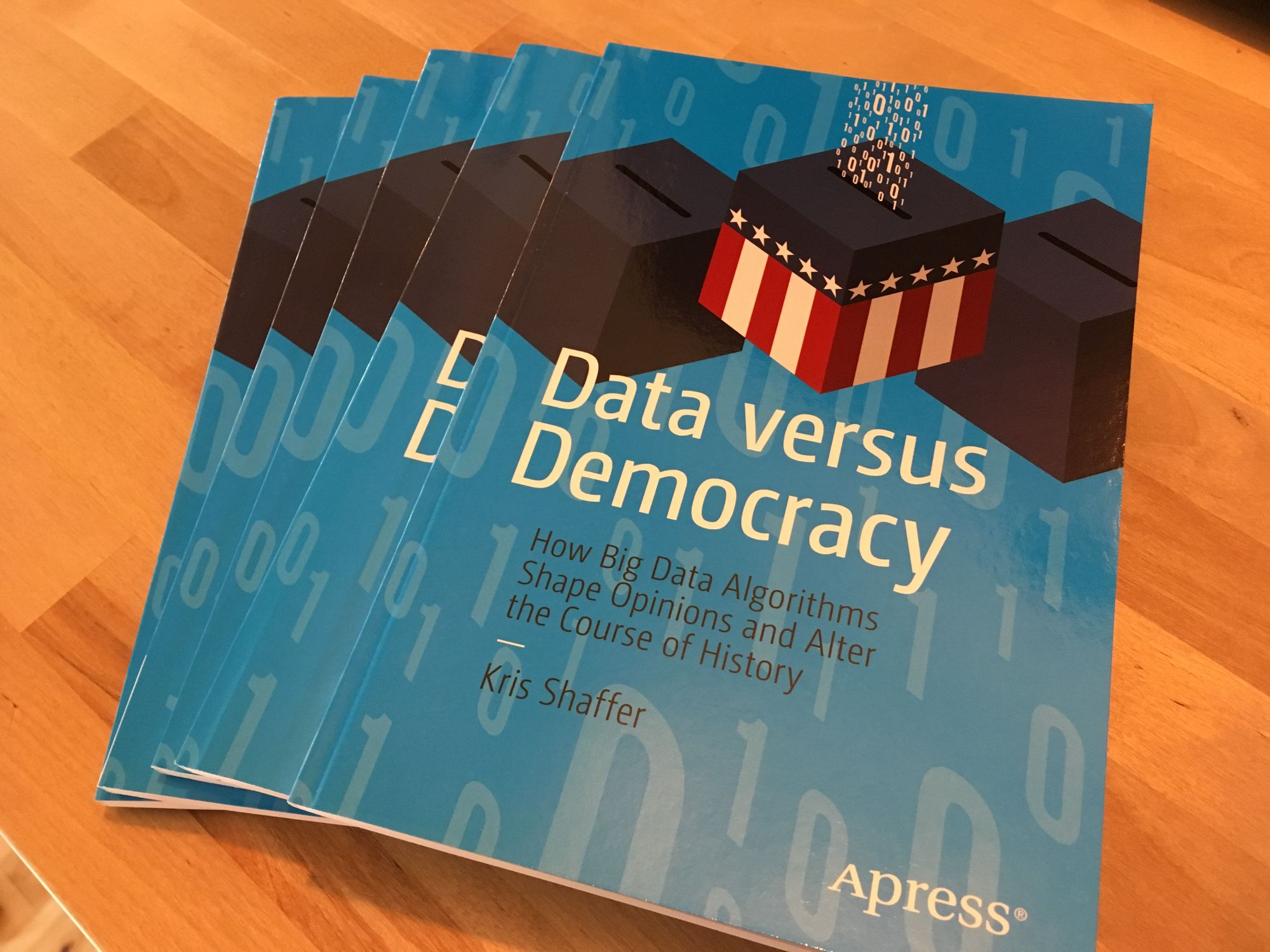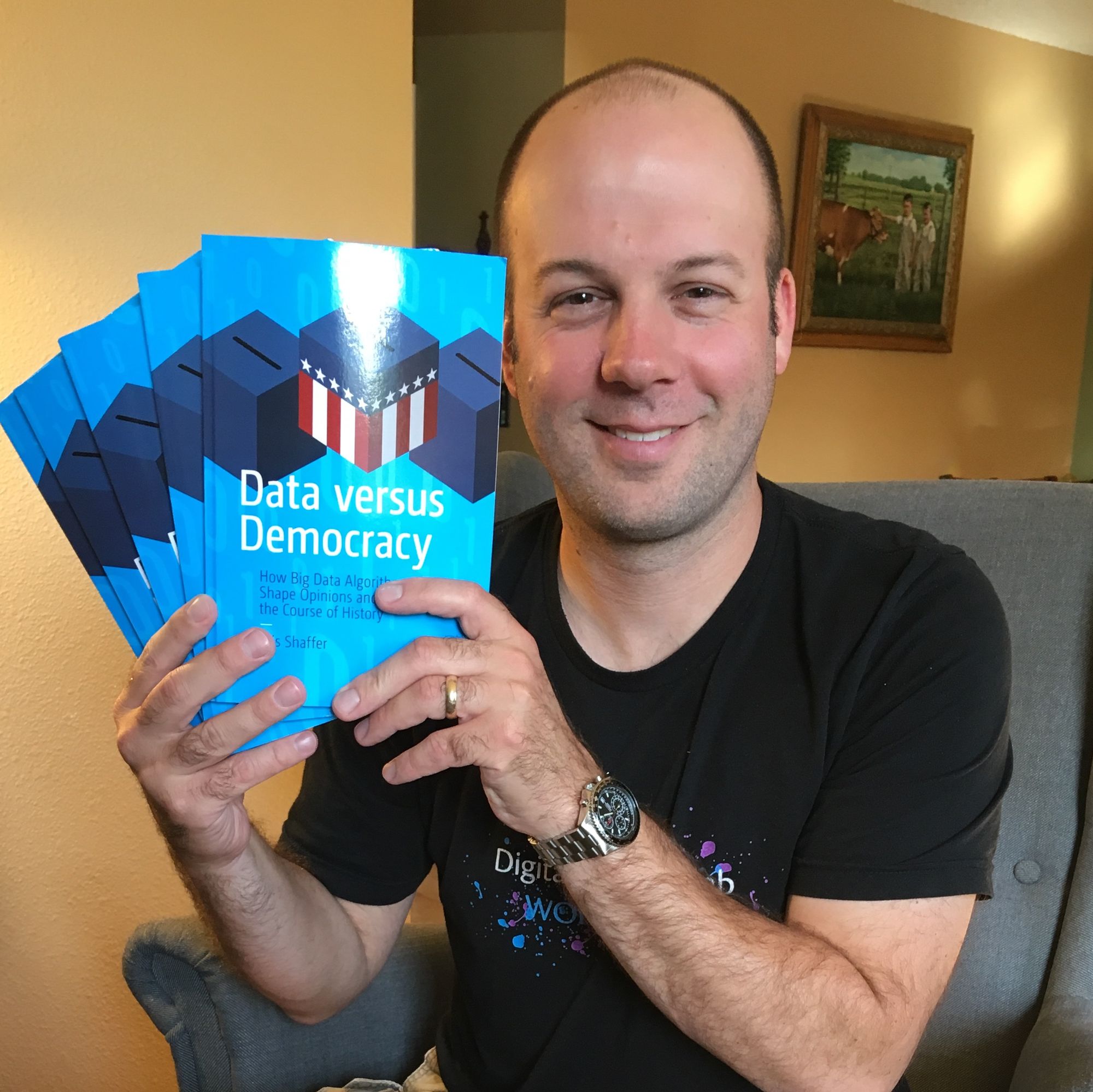Data versus Democracy is out!
Data versus Democracy: How Big Data Algorithms Shape Opinions and Alter the Course of History — available now!

So... I did a thing.
Over the past year, I've been writing a book about online propaganda and its effects on society. It's called Data versus Democracy: How Big Data Algorithms Shape Opinions and Alter the Course of History, and it's available now! You can order the print edition now from my publisher, from Amazon, or from your local bookstore, or you can download the ebook right now!
And because people have asked, there is no "best" place to buy it to support me. I get identical royalites for print and ebook, and while I get more royalties from each sale directly from my publisher, purchases on Amazon — and especially positive reviews — boost its visibility in Amazon's algorithm. (Read more about that kind of thing in Chapter 3. *wink*) So the bottom line is, if you're interested, just buy it wherever is convenient for you. And if you like it, please consider writing a review on Amazon!

It's been a really interesting experience, as I've drawn on my research over the past few years into digital media and disinformation, as well as the cognitive science research that I did back in my music theory days.
The book starts by walking through the sociology and the science of propaganda. We live in an "attention economy", where our attention is the commodity and "engagement" is the metric. This is, in many ways, the core of the propaganda problem: limited human attention makes it easier than we admit for others to manipulate us through media, and measuring our engagement with that media all but requires pervasive data mining and surveillance.
Now, understanding how the limits of human attention make us vulnerable to manipulative media requires diving into some cognitive science. Don't worry, I try to keep it light with a lot of illustrations from music and food. ;) Understanding how digital platforms facilitate that manipulation requires diving into how content recommendation algorithms work, and why our personal data has to be collected in order to fuel those algorithms. Again, I use as down-to-earth examples as I can (no code, no math equations!) to explain all that.
With that out of the way, I walk through case studies — examples of how digital platforms have enabled activist groups to grow, trolling communities to organize, and governments to manipulate citizens, both their own citizens and citizens of other countries. This includes things like GamerGate, the Great Meme War, and the online threats to elections and civil discourse in countries from the U.S. to Brazil to Sweden to Myanmar.
While there is certainly a lot to be dismayed about, I try to end the book on a positive note. Some gains have been made by platforms, researchers, and governments. And we have laid the groundwork for the kinds of public-private partnerships we'll need to keep moving forward in solving this problem.
I'm really excited about the release of Data versus Democracy. It's the result of a lot of hard work and the support of a lot of people (whom I'm still in the process of thanking formally). I hope it will help many who read it come to a more informed and more nuanced understanding of the nature of disinformation. Maybe we'll stop talking in simplistic terms about "fake news", censorship, and Russian "bots", and we'll have deeper discussions of how to foster a society in which we use our technological advances for the good of everyone.
If you are a member of the press, or you have a podcast or a blog, I'm available for interviews! Either about the book, or just about the nature of digital propaganda and the psychology of manipulative media. I'm also available for talks — especially with students. I'm a teacher at heart (and by training), and I love talking through the issues with students. I'm purposefully hard to contact via some channels, but worst case, you can always ping me on Twitter.
If you'd like to find out more about the book, feel free to check out the chapter list and sample text on the official book site or download the Kindle preview. The full official description is below:
Human attention is in the highest demand it has ever been. The drastic increase in available information has compelled individuals to find a way to sift through the media that is literally at their fingertips. Content recommendation systems have emerged as the technological solution to this social and informational problem, but they’ve also created a bigger crisis in confirming our biases by showing us only, and exactly, what it predicts we want to see.
Data versus Democracy investigates and explores how, in the era of social media, human cognition, algorithmic recommendation systems, and human psychology are all working together to reinforce (and exaggerate) human bias. The dangerous confluence of these factors is driving media narratives, influencing opinions, and possibly changing election results.
In this book, algorithmic recommendations, clickbait, familiarity bias, propaganda, and other pivotal concepts are analyzed and then expanded upon via fascinating and timely case studies: the 2016 US presidential election, Ferguson, GamerGate, international political movements, and more events that come to affect every one of us.
What are the implications of how we engage with information in the digital age? Data versus Democracy explores this topic and an abundance of related crucial questions. We live in a culture vastly different from any that has come before. In a society where engagement is currency, we are the product. Understanding the value of our attention, how organizations operate based on this concept, and how engagement can be used against our best interests is essential in responsibly equipping ourselves against the perils of disinformation.
